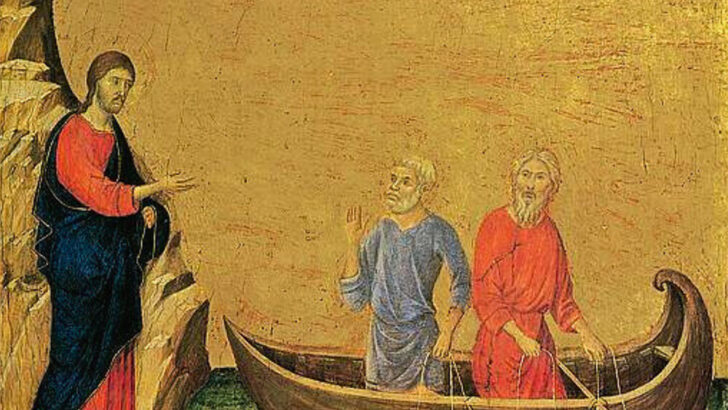Is 6:1-2a, 3-8
Ps 138:1-2, 2-3, 4-5, 7-8
1 Cor 15:1-11 or 1 Cor 15:3-8, 11
Lk 5:1-11
The question I hear most frequently from those I meet for the first time is this: “Why did you become a priest, and how did it happen?” To which I typically provide a quick and insightful response: “Well, it’s complicated.” Indeed, the journey of anyone who has chosen to enter religious life and priesthood, is intertwined with mystery, great expectations, discernment, and a sense of unworthiness. It is a path filled with questions and a search for answers, some of which emerge only after a lengthy exploration. This entire process and more can be encapsulated in a single word: ‘vocation’ which, surprisingly, extends beyond just priests and nuns.
Discernment
Whether somebody enters the path of serving God in the abovementioned ministry – the priesthood in my case – or chooses a family life and professional career, a similar question can be asked of the latter: “Why did you become a Christian, and how did it happen?” Of course, most of us, in that case, would be confused about what answer to give. After all, the majority of us have been baptised as babies. Somehow, that decision was imposed on us; it came from our parents’ faith rather than our free and conscious decision. We would probably have to think about giving a reasonable answer. And above all, we would have to provide that answer first to ourselves.
After the initial stage of discerning what we are doing in life as Christian beings, when we come to a genuine appreciation of the faith inherited from our parents and ancestors, the thought that usually occupies our minds is this: “Am I worthy of being called ‘a Child of Almighty God’?”
Unworthiness
I genuinely believe that the feeling of unworthiness to uphold the title of a Christian – whether one is a woman or a man, a priest or a nun, lay or religious, and so forth – is a positive thing. Why? Firstly, because this sentiment is not unfamiliar to most biblical characters. For instance, let us consider the figures mentioned in this Sunday’s liturgy. The first reading, from the Prophet Isaiah, references King Uzzaiah (Isaiah 6:1), right in its opening sentence. About eight centuries before Christ, this king (also referred to as Azariah) reigned over the Southern Kingdom of Judah for more than 50 years. Ascending to the throne at a young age, he implemented many beneficial reforms in the kingdom. However, in the latter part of his life, he endured an unspeakable affliction. He became a leper. How might this king have felt when individuals of a similar position regarded him as unworthy of the throne due to his illness? Objectively speaking, this type of ailment, which signified an imminent death sentence for him, would be sufficient to cast doubt on the significance of his election as king from that point onward.
”But let’s continue! The main character from our first reading remains filled with that sense of unworthiness: the prophet Isaiah speaks of himself, “What a wretched state I am in! I am lost, for I am a man of unclean lips, and I dwell among a people of unclean lips” (Isaiah 6:5). On the previous Sunday, we listened to the moment when Isaiah was called and chosen as a prophet. Today, however, we can see what his prophetic work involves. Indeed, the prophet Isaiah was personally and directly called by the Lord! He was the one who understood what the will of God is towards his people and the nation. Yet, he was also keenly aware of his limitations and shortcomings, recognising that the people, authorities, and religious leaders would resist him immediately if he were to preach God’s will. All this, and certainly more, led him to express the abovementioned words of doubt, reflecting a profound sense of his own unworthiness to respond to God’s call.
But let’s proceed to examine the grande finale of the main ‘characters’ in the biblical narrative presented before us this Sunday. The second reading from the First Letter to the Corinthians is also quite fascinating. There, we hear the words of good news about Jesus Christ, proclaimed by none other than the Apostle Paul, who concludes with a rather poignant statement: “I am the least of the apostles; in fact, since I persecuted the Church of God, I hardly deserve the title of apostle; but by God’s grace, that is what I am” (1 Corinthians 15:9). No explanation is required. The truth regarding Paul’s past is well recognised. He was a persecutor of the Church, a man devoted to the Old Law until innocent blood was shed.
Lastly, on the list of biblical characters from this Sunday, we must include the one mentioned in the Gospel. Although others were also on the lake, it is Peter whom the Gospel predominantly discusses. In response to a significant miracle performed by the Lord, Peter simply states: “Leave me, Lord, for I am a sinful man” (Luke 5:8) as though he understood that for him, there was no possibility of advancing further with THIS MASTER.
Great faithfulness
And yet, oh blessed fault, God’s goodness and faithfulness reveal themselves, especially through our infirmities, weaknesses, limitations, shortcomings and omissions.
You see, God does not call you to be the greatest. No, He does not even want you to be the most effective servant or preacher. But He certainly wants you to rely on Him entirely. To “Trust in the LORD with all your heart, and do not depend on your own understanding” (Proverbs 3:5). That is precisely where King Uzziah, Prophet Isaiah, Apostle Paul, St Peter, and many others eventually arrive. And that is where they come to the acknowledgment of who they truly are. They are Christians, the people of Salvation. Salvation is something they do not earn by themselves, but which they freely and undeservedly receive from their loving Father in Heaven.
And so, dear readers, it appears that even our blind spots, weaknesses, and omissions can sometimes prove to be worthwhile. They can illuminate who we are and who we are not.
Do you realise what God calls you to? Do you appreciate this?
Fr Dominik Domagala OMI serves in Inchicore, Dublin. Studied Theology in Poznan (Poland) and currently is working on a Licentiate in Sacred Scripture. Author of the sermon-video-blog “The Social Oblate.” Send your questions to thesocialoblate@icloud.com


 Fr Dominik Domagala
Fr Dominik Domagala The calling of the apostles Peter and
Andrew, Duccio di Buoninsegna.
The calling of the apostles Peter and
Andrew, Duccio di Buoninsegna.
